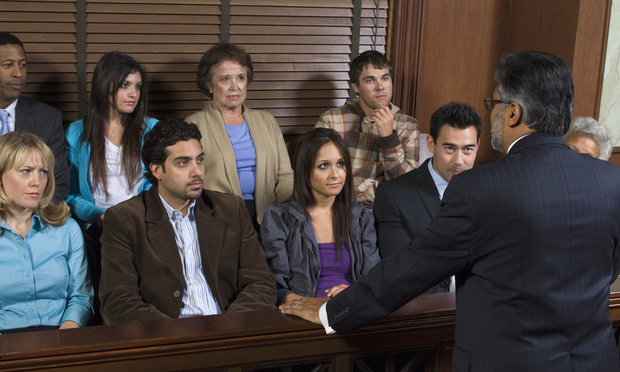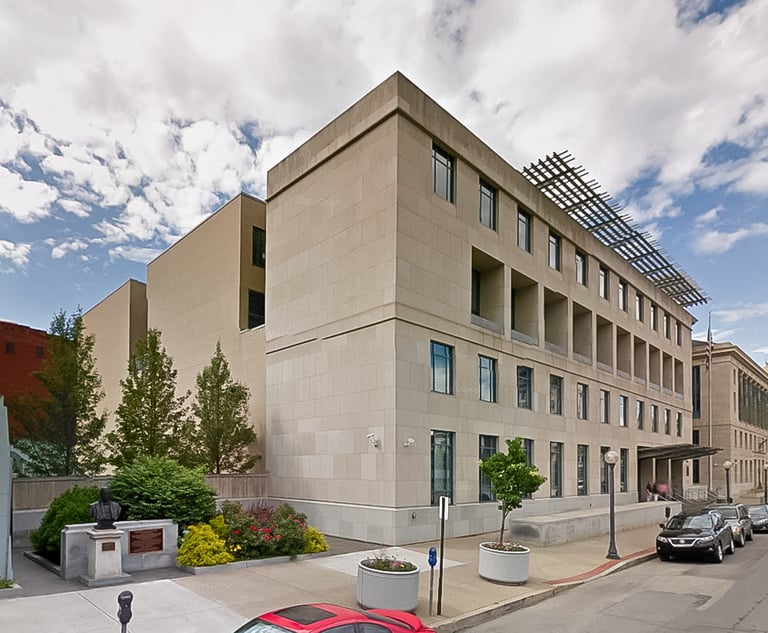Case of the Two Susquehanna DAs Getting More Tangled
According to one lawyer involved in the case, the dispute could put prosecutions in the northeastern Pennsylvania county in jeopardy.
February 07, 2018 at 07:11 PM
4 minute read
 Photo: Shutterstock.com
Photo: Shutterstock.com Susquehanna County still has two lawyers claiming to be the local district attorney, and the matter is only gaining in complexity after the Pennsylvania Supreme Court declined to weigh in.
For the past month, a dispute has been brewing between the two attorneys—William Urbanski and Marion O'Malley. As of late last week, Urbanski had sued O'Malley in the Court of Common Pleas seeking to have her removed from office, and, according to one lawyer involved in the case, the dispute could put prosecutions in the northeastern Pennsylvania county in jeopardy.
Urbanski and O'Malley are both former prosecutors.
Urbanski had been the first assistant district attorney under former Susquehanna DA Robert Klein, who died late last year.
O'Malley had worked as first assistant district attorney under Klein's predecessor, Jason Legg, who later went on to become Susquehanna's only commissioned judge.
The dispute arose after Klein died in December. Although Urbanski contended that he should take over leading the office, Legg declined to swear Urbanski into the position, finding, instead, that Urbanski had not been a resident of Susquehanna before Klein's death.
Urbanski had sued Legg last month, seeking that the Supreme Court invalidate Legg's interpretation of the residency requirements. On Monday, the Supreme Court declined to take up the action, but said Urbanski could still raise a quo warranto action in the Susquehanna trial court, which could “be heard on an expedited basis.”
According to Urbanski's attorney, Bruce L. Castor Jr. of Rogers Castor, that decision kicked off a series of events that have further complicated the situation and could jeopardize prosecutions underway in the county.
Before Monday, although O'Malley had been challenging Urbanski's claim to the position in court, Legg had agreed not to officially administer the oath of office to O'Malley until after a court had ruled on the issue. In the meantime, Urbanski had been leading the office.
However, after the Supreme Court declined to take up the dispute, O'Malley was sworn in as the county's lead prosecutor. She then fired Urbanski the same day.
Urbanski responded with the quo warranto suit, which he filed Wednesday.
According to Castor, Urbanski had agreed to have O'Malley assume the office because he would not have been able to file the quo warranto action without someone else as the acting district attorney. However, he said, Urbanski had not expected to be fired without having a court ruling on the dispute first.
“It was a wonderful academic problem, until the purported firing of Urbanski made it into an actual problem,” Castor said.
Castor contended that, with both Urbanski and O'Malley in the office, the prosecutors would have their bases covered legally so none of the criminal prosecutions could be questioned once a court sorted out the dispute. However, he said, with O'Malley heading the office, if it is determined that Urbanski was the rightful district attorney, the cases she handles could be invalidated.
“I love this case as an academic argument, but when it comes down to it, there are victims of crime expecting their cases to be properly adjudicated, and right now there's some doubt about that,” Castor said.
Castor said that the Susquehanna DA's Office typically is handling about 300 cases at any given time.
O'Malley's attorney is Matthew Haverstick of Kleinbard LLC. Haverstick did not return a call for comment Wednesday, but on Tuesday, the day Urbanski filed suit, Haverstick said “it would be in the best interest of everybody in the county if it just stays as-is and O'Malley stays put.”
“In the event Mr. Urbanski wants to try to challenge it, the Supreme Court has made clear that the matter has to be dealt with quickly,” Haverstick said.
With the quo warranto action now in the trial court, an out-of-county judge is expected to be selected to preside over the case.
Castor said the lower court could make a ruling quickly, but, depending on whether the case must be appealed directly to the Supreme Court, or if it must first go through the Commonwealth Court, a full resolution could be a long way off.
This content has been archived. It is available through our partners, LexisNexis® and Bloomberg Law.
To view this content, please continue to their sites.
Not a Lexis Subscriber?
Subscribe Now
Not a Bloomberg Law Subscriber?
Subscribe Now
NOT FOR REPRINT
© 2025 ALM Global, LLC, All Rights Reserved. Request academic re-use from www.copyright.com. All other uses, submit a request to [email protected]. For more information visit Asset & Logo Licensing.
You Might Like
View All
Harrisburg Jury Hands Up $1.5M Verdict to Teen Struck by Underinsured Driver
3 minute read
Middle District of Pennsylvania's U.S. Attorney Announces Resignation
2 minute read
High Court Revives Kleinbard's Bid to Collect $70K in Legal Fees From Lancaster DA
4 minute read
Immunity for Mental Health Care and Coverage for CBD: What's on the Pa. High Court's November Calendar
5 minute readTrending Stories
- 1Rejuvenation of a Sharp Employer Non-Compete Tool: Delaware Supreme Court Reinvigorates the Employee Choice Doctrine
- 2Mastering Litigation in New York’s Commercial Division Part V, Leave It to the Experts: Expert Discovery in the New York Commercial Division
- 3GOP-Led SEC Tightens Control Over Enforcement Investigations, Lawyers Say
- 4Transgender Care Fight Targets More Adults as Georgia, Other States Weigh Laws
- 5Roundup Special Master's Report Recommends Lead Counsel Get $0 in Common Benefit Fees
Who Got The Work
J. Brugh Lower of Gibbons has entered an appearance for industrial equipment supplier Devco Corporation in a pending trademark infringement lawsuit. The suit, accusing the defendant of selling knock-off Graco products, was filed Dec. 18 in New Jersey District Court by Rivkin Radler on behalf of Graco Inc. and Graco Minnesota. The case, assigned to U.S. District Judge Zahid N. Quraishi, is 3:24-cv-11294, Graco Inc. et al v. Devco Corporation.
Who Got The Work
Rebecca Maller-Stein and Kent A. Yalowitz of Arnold & Porter Kaye Scholer have entered their appearances for Hanaco Venture Capital and its executives, Lior Prosor and David Frankel, in a pending securities lawsuit. The action, filed on Dec. 24 in New York Southern District Court by Zell, Aron & Co. on behalf of Goldeneye Advisors, accuses the defendants of negligently and fraudulently managing the plaintiff's $1 million investment. The case, assigned to U.S. District Judge Vernon S. Broderick, is 1:24-cv-09918, Goldeneye Advisors, LLC v. Hanaco Venture Capital, Ltd. et al.
Who Got The Work
Attorneys from A&O Shearman has stepped in as defense counsel for Toronto-Dominion Bank and other defendants in a pending securities class action. The suit, filed Dec. 11 in New York Southern District Court by Bleichmar Fonti & Auld, accuses the defendants of concealing the bank's 'pervasive' deficiencies in regards to its compliance with the Bank Secrecy Act and the quality of its anti-money laundering controls. The case, assigned to U.S. District Judge Arun Subramanian, is 1:24-cv-09445, Gonzalez v. The Toronto-Dominion Bank et al.
Who Got The Work
Crown Castle International, a Pennsylvania company providing shared communications infrastructure, has turned to Luke D. Wolf of Gordon Rees Scully Mansukhani to fend off a pending breach-of-contract lawsuit. The court action, filed Nov. 25 in Michigan Eastern District Court by Hooper Hathaway PC on behalf of The Town Residences LLC, accuses Crown Castle of failing to transfer approximately $30,000 in utility payments from T-Mobile in breach of a roof-top lease and assignment agreement. The case, assigned to U.S. District Judge Susan K. Declercq, is 2:24-cv-13131, The Town Residences LLC v. T-Mobile US, Inc. et al.
Who Got The Work
Wilfred P. Coronato and Daniel M. Schwartz of McCarter & English have stepped in as defense counsel to Electrolux Home Products Inc. in a pending product liability lawsuit. The court action, filed Nov. 26 in New York Eastern District Court by Poulos Lopiccolo PC and Nagel Rice LLP on behalf of David Stern, alleges that the defendant's refrigerators’ drawers and shelving repeatedly break and fall apart within months after purchase. The case, assigned to U.S. District Judge Joan M. Azrack, is 2:24-cv-08204, Stern v. Electrolux Home Products, Inc.
Featured Firms
Law Offices of Gary Martin Hays & Associates, P.C.
(470) 294-1674
Law Offices of Mark E. Salomone
(857) 444-6468
Smith & Hassler
(713) 739-1250





